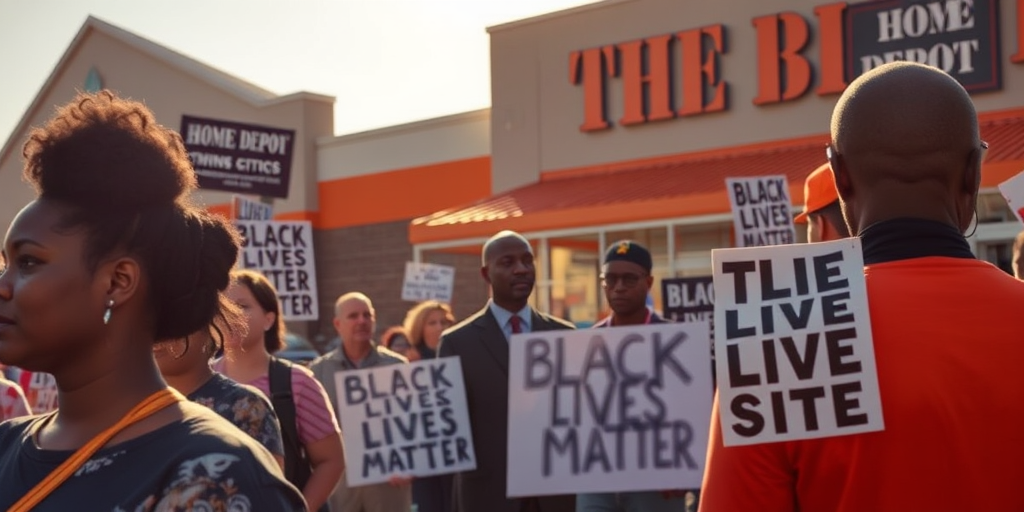Appeals Court Upholds Twin Cities Home Depot’s Ban on Black Lives Matter Insignia
In a notable decision with wide-ranging implications, an appeals court has reaffirmed a Twin Cities Home Depot’s decision to prohibit employees from wearing Black Lives Matter insignia. This ruling underscores the retail giant’s right to enforce uniform guidelines, sustaining their stance of promoting workplace neutrality and uniformity.
Summary of the Ruling
The court’s decision confirms the legality of Home Depot’s policy, which has been a subject of debate since Caro Linda Bo, a former worker at the Northeast Minneapolis branch, resigned in early 2021 due to alleged workplace racism. Bo’s departure highlighted ongoing tensions regarding the company’s dress code, which bans any insignia, including those advocating social or political causes like Black Lives Matter.
The ruling asserts that the company has the authority to dictate dress codes to maintain a consistent image and work environment, a perspective shared by many large corporations aiming to avoid polarization within the workplace.
Tensions and Background
Home Depot’s policy against displaying social or political messages has sparked significant debate over the extent of employee rights to express personal or political beliefs at work. The policy, branded as a measure to maintain ‘uniformity and neutrality,’ is seen by critics, including former employees like Bo, as suppressive of individual expression concerning pivotal societal issues.
Local resident Amelia Johnson expressed her concerns, “While I understand the need for professional attire, companies need to recognize the importance of social movements and allow their employees the right to express their support, especially on critical issues like racial justice.”
This dispute traces back to broader national conversations over workplace expression and policies developed in response to sociopolitical movements becoming more prominent in everyday life.
Community Impact
The court’s ruling bears a mixed impact on the Twin Cities community. Advocates for freedom of expression worry about the potential chilling effect on employees who wish to support social justice causes. Conversely, some community members see the decision as a necessary measure in maintaining a distraction-free workplace.
Matthew Clarkson, a business ethics expert at the University of Minnesota, notes that such rulings remind local businesses of the delicate balance between corporate policies and employees’ rights. “The community must approach these situations understanding the legal frameworks that guide such policies, yet continue advocating for workplaces that reflect the diverse voices within our society,” Clarkson remarked.
Related Local and National Context
The ruling arrives amidst a backdrop of other significant legal and economic developments in the region. Just as Home Depot maintains its policy, Minnesota Rusco, a local company, has filed for bankruptcy following an unexpected shutdown, raising concerns about economic stability within the area.
On a national scale, the U.S. Supreme Court has also been embroiled in controversy, upholding a decision allowing former President Trump to restrict transgender and nonbinary individuals from selecting their sex markers on passports. This move has further stirred debates about LGBTQ+ rights under federal policies.
Locally, these events intertwine to illustrate a landscape where legal rulings carry immense weight in sculpting the community’s sociopolitical and economic environment.
Looking to the Future
The implications of the appeals court’s decision may extend beyond Home Depot and influence how other businesses formulate their dress policies concerning social insignias. While the current ruling favors company-led neutrality, it sets a precedent that could either inspire similar strategies or galvanize movements advocating for greater expression rights within the workplace.
There is a burgeoning dialogue about how businesses can strike a balance between promoting inclusivity and maintaining operational independence from the societal issues that employees deeply care about.
Resources for Community Engagement
Residents interested in engaging with this topic can attend local forums and discussions hosted by community advocacy groups such as the Minnesota chapter of the ACLU and various labor unions. These organizations offer resources and guidance on understanding employee rights within the landscape of corporate policies.
To encourage broader participation, Woke News will host a series of events aimed at fostering conversation around workplace policies and their impacts on employee rights and community cohesion. Residents can visit the Woke News website for details on these upcoming events.
In conclusion, while the court’s decision adds another chapter to the ongoing discussion of workplace expression and employee rights, it underscores the need for continuous dialogue and thoughtful policymaking attuned to both legal standards and community values.







